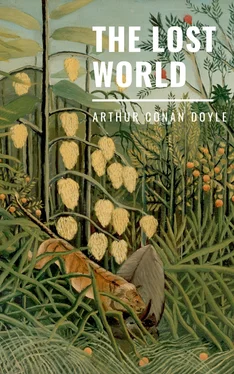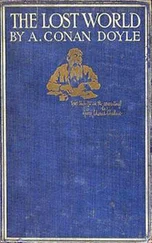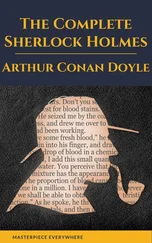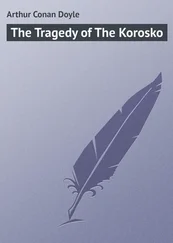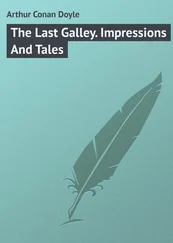"To what known creature does that bone belong?" asked the Professor.
I examined it with care and tried to recall some half-forgotten knowledge.
"It might be a very thick human collar-bone," I said.
My companion waved his hand in contemptuous deprecation.
"The human collar-bone is curved. This is straight. There is a groove upon its surface showing that a great tendon played across it, which could not be the case with a clavicle."
"Then I must confess that I don't know what it is."
"You need not be ashamed to expose your ignorance, for I don't suppose the whole South Kensington staff could give a name to it." He took a little bone the size of a bean out of a pill-box. "So far as I am a judge this human bone is the analogue of the one which you hold in your hand. That will give you some idea of the size of the creature. You will observe from the cartilage that this is no fossil specimen, but recent. What do you say to that?"
"Surely in an elephant——"
He winced as if in pain.
"Don't! Don't talk of elephants in South America. Even in these days of Board schools——"
"Well," I interrupted, "any large South American animal—a tapir, for example."
"You may take it, young man, that I am versed in the elements of my business. This is not a conceivable bone either of a tapir or of any other creature known to zoology. It belongs to a very large, a very strong, and, by all analogy, a very fierce animal which exists upon the face of the earth, but has not yet come under the notice of science. You are still unconvinced?"
"I am at least deeply interested."
"Then your case is not hopeless. I feel that there is reason lurking in you somewhere, so we will patiently grope round for it. We will now leave the dead American and proceed with my narrative. You can imagine that I could hardly come away from the Amazon without probing deeper into the matter. There were indications as to the direction from which the dead traveler had come. Indian legends would alone have been my guide, for I found that rumors of a strange land were common among all the riverine tribes. You have heard, no doubt, of Curupuri?"
"Never."
"Curupuri is the spirit of the woods, something terrible, something malevolent, something to be avoided. None can describe its shape or nature, but it is a word of terror along the Amazon. Now all tribes agree as to the direction in which Curupuri lives. It was the same direction from which the American had come. Something terrible lay that way. It was my business to find out what it was."
"What did you do?" My flippancy was all gone. This massive man compelled one's attention and respect.
"I overcame the extreme reluctance of the natives—a reluctance which extends even to talk upon the subject—and by judicious persuasion and gifts, aided, I will admit, by some threats of coercion, I got two of them to act as guides. After many adventures which I need not describe, and after traveling a distance which I will not mention, in a direction which I withhold, we came at last to a tract of country which has never been described, nor, indeed, visited save by my unfortunate predecessor. Would you kindly look at this?"
He handed me a photograph—half-plate size.
"The unsatisfactory appearance of it is due to the fact," said he, "that on descending the river the boat was upset and the case which contained the undeveloped films was broken, with disastrous results. Nearly all of them were totally ruined—an irreparable loss. This is one of the few which partially escaped. This explanation of deficiencies or abnormalities you will kindly accept. There was talk of faking. I am not in a mood to argue such a point."
The photograph was certainly very off-colored. An unkind critic might easily have misinterpreted that dim surface. It was a dull gray landscape, and as I gradually deciphered the details of it I realized that it represented a long and enormously high line of cliffs exactly like an immense cataract seen in the distance, with a sloping, tree-clad plain in the foreground.
"I believe it is the same place as the painted picture," said I.
"It is the same place," the Professor answered. "I found traces of the fellow's camp. Now look at this."
It was a nearer view of the same scene, though the photograph was extremely defective. I could distinctly see the isolated, tree-crowned pinnacle of rock which was detached from the crag.
"I have no doubt of it at all," said I.
"Well, that is something gained," said he. "We progress, do we not? Now, will you please look at the top of that rocky pinnacle? Do you observe something there?"
"An enormous tree."
"But on the tree?"
"A large bird," said I.
He handed me a lens.
"Yes," I said, peering through it, "a large bird stands on the tree. It appears to have a considerable beak. I should say it was a pelican."
"I cannot congratulate you upon your eyesight," said the Professor. "It is not a pelican, nor, indeed, is it a bird. It may interest you to know that I succeeded in shooting that particular specimen. It was the only absolute proof of my experiences which I was able to bring away with me."
"You have it, then?" Here at last was tangible corroboration.
"I had it. It was unfortunately lost with so much else in the same boat accident which ruined my photographs. I clutched at it as it disappeared in the swirl of the rapids, and part of its wing was left in my hand. I was insensible when washed ashore, but the miserable remnant of my superb specimen was still intact; I now lay it before you."
From a drawer he produced what seemed to me to be the upper portion of the wing of a large bat. It was at least two feet in length, a curved bone, with a membranous veil beneath it.
"A monstrous bat!" I suggested.
"Nothing of the sort," said the Professor, severely. "Living, as I do, in an educated and scientific atmosphere, I could not have conceived that the first principles of zoology were so little known. Is it possible that you do not know the elementary fact in comparative anatomy, that the wing of a bird is really the forearm, while the wing of a bat consists of three elongated fingers with membranes between? Now, in this case, the bone is certainly not the forearm, and you can see for yourself that this is a single membrane hanging upon a single bone, and therefore that it cannot belong to a bat. But if it is neither bird nor bat, what is it?"
My small stock of knowledge was exhausted.
"I really do not know," said I.
He opened the standard work to which he had already referred me.
"Here," said he, pointing to the picture of an extraordinary flying monster, "is an excellent reproduction of the dimorphodon, or pterodactyl, a flying reptile of the Jurassic period. On the next page is a diagram of the mechanism of its wing. Kindly compare it with the specimen in your hand."
A wave of amazement passed over me as I looked. I was convinced. There could be no getting away from it. The cumulative proof was overwhelming. The sketch, the photographs, the narrative, and now the actual specimen—the evidence was complete. I said so—I said so warmly, for I felt that the Professor was an ill-used man. He leaned back in his chair with drooping eyelids and a tolerant smile, basking in this sudden gleam of sunshine.
"It's just the very biggest thing that I ever heard of!" said I, though it was my journalistic rather than my scientific enthusiasm that was roused. "It is colossal. You are a Columbus of science who has discovered a lost world. I'm awfully sorry if I seemed to doubt you. It was all so unthinkable. But I understand evidence when I see it, and this should be good enough for anyone."
The Professor purred with satisfaction.
"And then, sir, what did you do next?"
"It was the wet season, Mr. Malone, and my stores were exhausted. I explored some portion of this huge cliff, but I was unable to find any way to scale it. The pyramidal rock upon which I saw and shot the pterodactyl was more accessible. Being something of a cragsman, I did manage to get half way to the top of that. From that height I had a better idea of the plateau upon the top of the crags. It appeared to be very large; neither to east nor to west could I see any end to the vista of green-capped cliffs. Below, it is a swampy, jungly region, full of snakes, insects, and fever. It is a natural protection to this singular country."
Читать дальше
